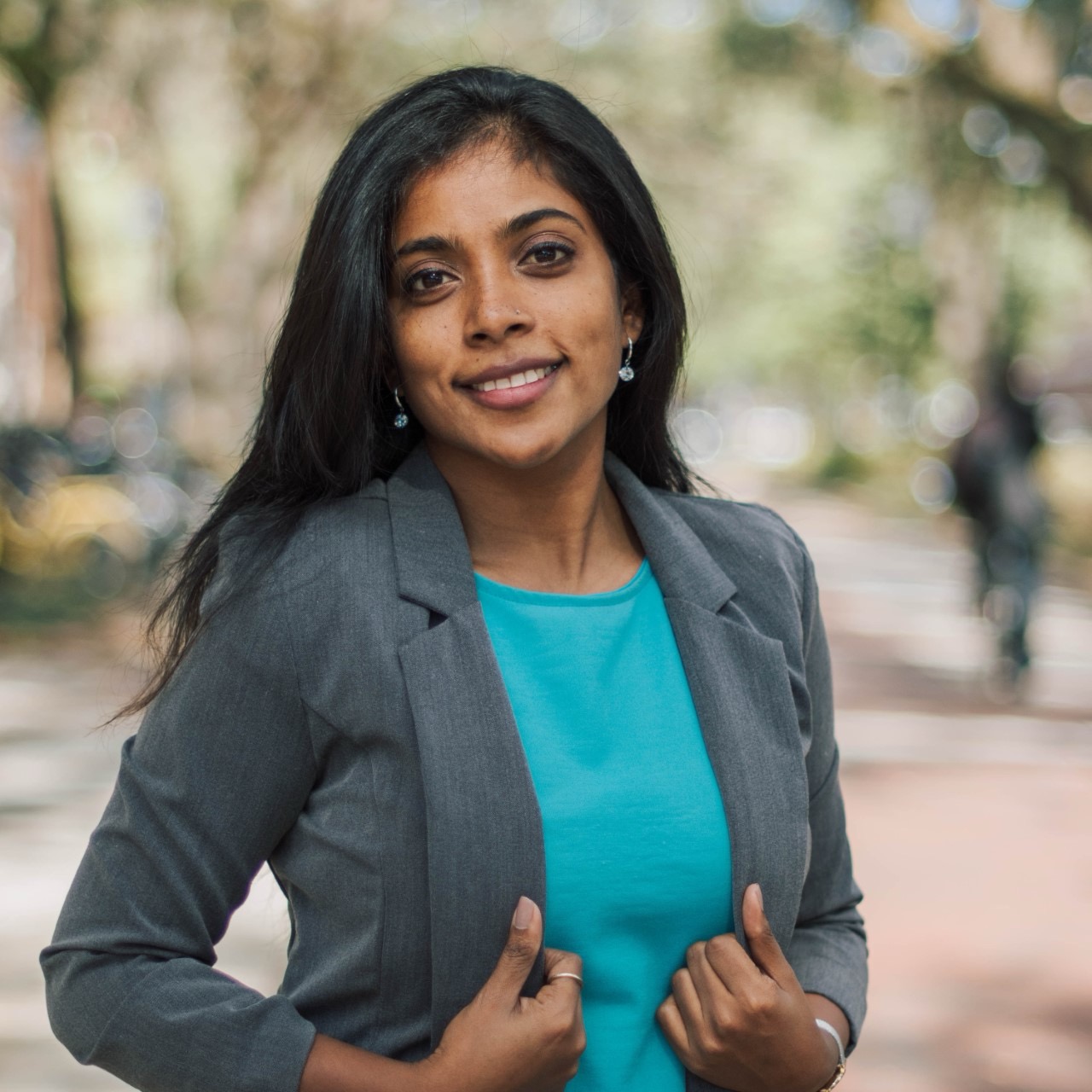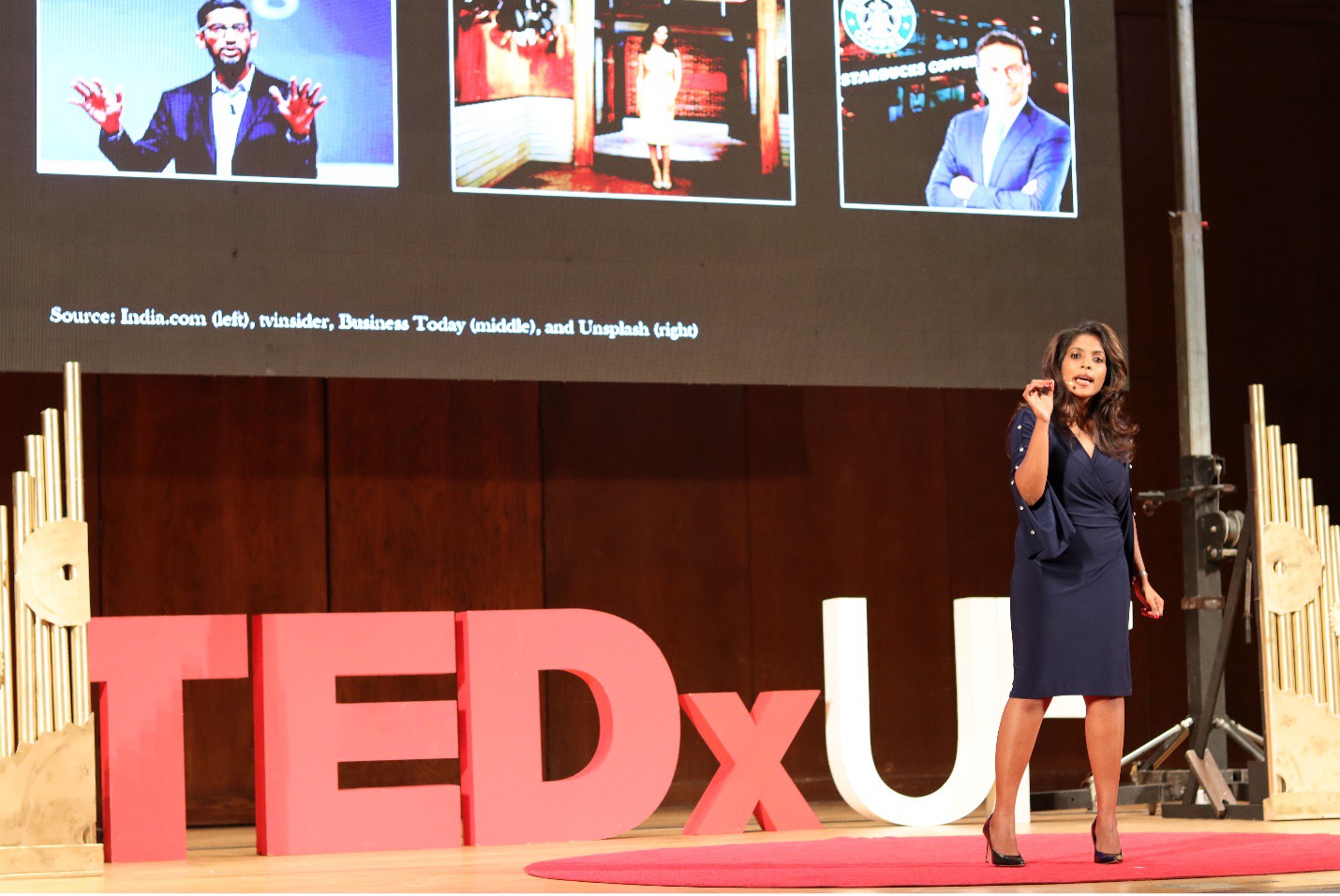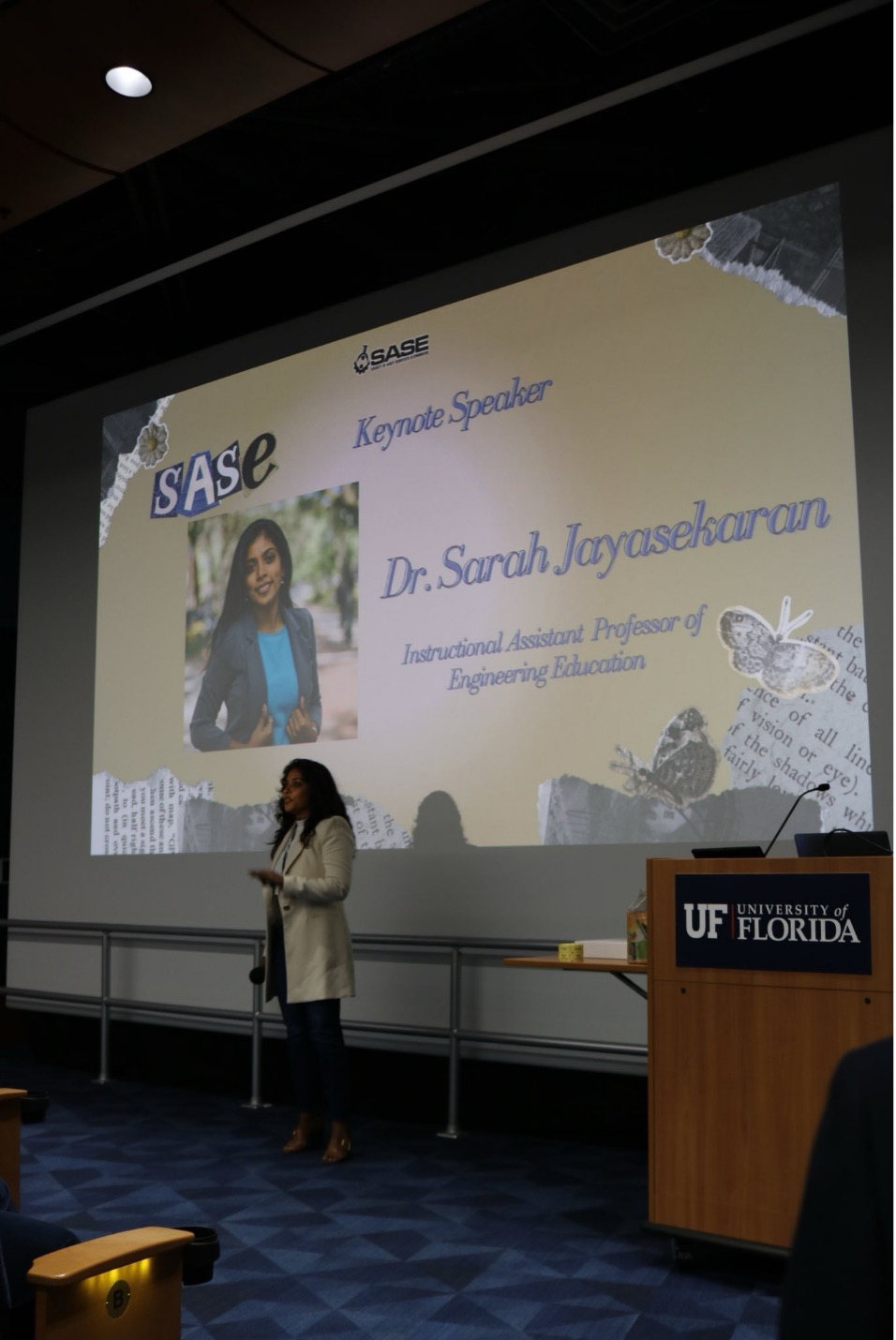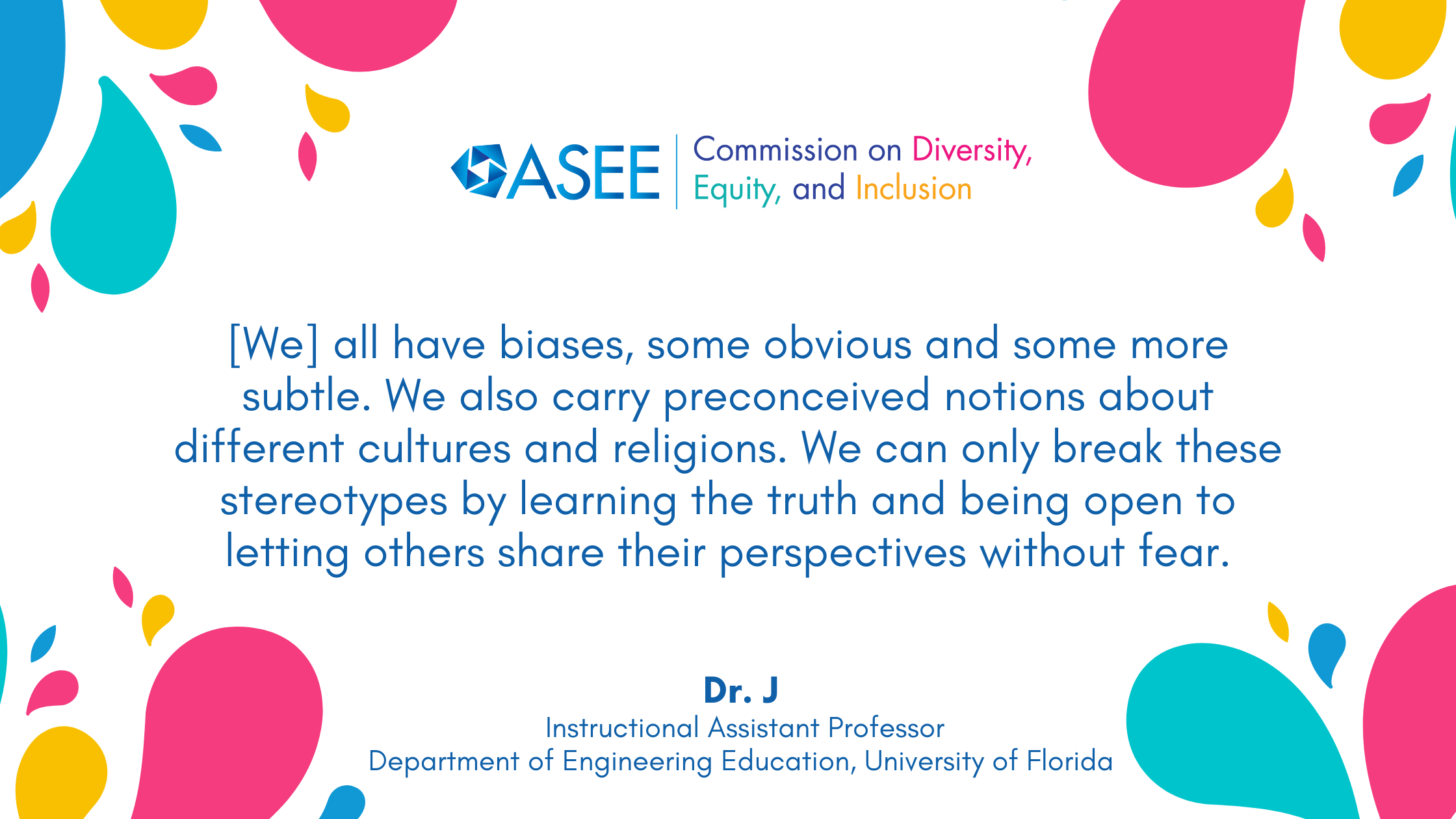ASEE CDEI Scholar Spotlight Series: Dr. Sarah Jayasekaran
Dr. Sarah Jayasekaran (Dr. J)
 Dr. Sarah Jayasekaran (Dr. J), born and raised in Chennai, India, pursued her passion for higher education in the United States, earning a Master’s in Structural Engineering and a Ph.D. in Civil Engineering. Currently, an Instructional Assistant Professor at the University of Florida, she brings infectious enthusiasm to her classroom, inspiring students to excel. Her work focuses on implementing smart educational concepts and improving student retention in Engineering. Dr. J’s dedication to her field is matched by her vibrant personal life. She is a CrossFit enthusiast, an animal lover, and enjoys culinary adventures. Her TEDx talk, “The Chocolate That Changed My Life,” reflects her journey to America and her personal experiences. Known for her optimism and belief in a bright future, Dr. J values self-care and embraces vulnerability. Her commitment to fostering an engaging learning environment makes her a respected educator and a positive influence in the field of engineering education.
Dr. Sarah Jayasekaran (Dr. J), born and raised in Chennai, India, pursued her passion for higher education in the United States, earning a Master’s in Structural Engineering and a Ph.D. in Civil Engineering. Currently, an Instructional Assistant Professor at the University of Florida, she brings infectious enthusiasm to her classroom, inspiring students to excel. Her work focuses on implementing smart educational concepts and improving student retention in Engineering. Dr. J’s dedication to her field is matched by her vibrant personal life. She is a CrossFit enthusiast, an animal lover, and enjoys culinary adventures. Her TEDx talk, “The Chocolate That Changed My Life,” reflects her journey to America and her personal experiences. Known for her optimism and belief in a bright future, Dr. J values self-care and embraces vulnerability. Her commitment to fostering an engaging learning environment makes her a respected educator and a positive influence in the field of engineering education.
Tell us your story of belongingness.
My maternal grandmother has been my biggest inspiration. She was an educator, a mother, a grandmother, and a staunch advocate for education and equality. Most importantly, she was a fighter for justice. Her boldness and courage have inspired me throughout my life, and my desire has always been to carry her legacy forward and inspire.
Growing up, I was inspired by Kalpana Chawla, an American astronaut of Indian origin and the first woman of Indian origin to go into space. Her journey into space inspired millions of girls in India, including me, and sparked my interest in engineering. My journey into education and my fascination with the USA began when I was 8 or 9 years old, after my neighbor returned from the USA with chocolates. A conversation between him and my dad ignited my curiosity about the West. My father believed that women could achieve anything they wanted, a view not commonly shared by others around me. He believed that I could change the world with my education and encouraged me to aim high, even suggesting that I could be the next Kalpana Chawla.
Moving to America was initially a shock as I missed my family, but it soon became a beautiful journey of self-discovery and unity. While India is a melting pot of its various states, America stands as a melting pot of the world. People from different countries and walks of life, each with their unique accents and incredible strengths, come together here.
 It was through my experience of not fitting in that I found my true calling and purpose. I realized I didn’t want to merely fit in; I wanted to belong, embracing my differences. This is what I love about America – people from all over the world find their place here. While engineering was my calling, teaching the next generation has become my passion. Being part of the engineering education department at the University of Florida has been instrumental in my growth, as I’ve had the privilege of learning from my incredible peers who come from diverse backgrounds and stages of life. Gainesville has become more of a home to me than any of my previous places, offering countless opportunities for personal and professional growth.
It was through my experience of not fitting in that I found my true calling and purpose. I realized I didn’t want to merely fit in; I wanted to belong, embracing my differences. This is what I love about America – people from all over the world find their place here. While engineering was my calling, teaching the next generation has become my passion. Being part of the engineering education department at the University of Florida has been instrumental in my growth, as I’ve had the privilege of learning from my incredible peers who come from diverse backgrounds and stages of life. Gainesville has become more of a home to me than any of my previous places, offering countless opportunities for personal and professional growth.
Since joining ASEE WIED, I have experienced significant growth. This involvement has provided me with opportunities to meet incredible individuals in high-ranking positions who are remarkably humble. It has been an enriching experience, contributing immensely to my journey and development. My TEDx talk, “The Chocolate That Changed My Life,” is about my life’s journey in USA.
Describe your understanding of DEI and why it is essential to what you do.
Growing up in India, I was immersed in a vibrant melting pot of diverse religions, languages, customs, colors, and castes. This diversity was a cherished aspect of my upbringing, where differences were celebrated, and friendships flourished across various cultural boundaries. If you know India, you understand its diversity. From east to west, north to south, there are about 121 languages. Indians follow multiple religions, and people come in all shades.
As a child in India, I didn’t focus on communal riots; instead, I experienced the celebration of diverse religious holidays and enjoyed the variety of foods prepared for these events. I cherished the days off for all these holidays and didn’t realize then that these experiences were shaping my heart to embrace diversity. In India, I began to understand the essence of DEI, but it was only after coming to the U.S. and meeting a wide array of people from around the globe that I fully grasped its meaning.
Engaging with individuals from various backgrounds, observing their strengths, embracing their identities, and sharing their cultures has profoundly broadened my perspective and personal growth. I hadn’t realized the extent of what there was to learn about other cultures and how much bias is unknowingly embedded in our systems through media, family, and societal perspectives. It is through genuine connections and learning about people that I have come to truly understand and appreciate DEI.
This is essential because we all have biases, some obvious and some more subtle. We also carry preconceived notions about different cultures and religions. We can only break these stereotypes by learning the truth and being open to letting others share their perspectives without fear.
As engineers, we are known for our problem-solving nature. How can we solve the world’s problems if we are not open to learning about the people, cultures, struggles, and pains of those different from us?
Briefly explain the current initiatives that you are doing towards DEI.
Within my department, my role as the Chair of the IDEA Committee since August 2022 has been particularly impactful. Each month, during our faculty meetings, I share valuable resources and initiatives that can benefit our members. For instance, recently, I introduced the CALM app (free for UF employees) as a tool to support mental health, recognizing the importance of well-being in our academic community. I create informative slides for faculty meetings to provide valuable insights and ensure that our discussions are productive and focused.
I also organize special events to celebrate cultural and historical milestones. For Hispanic Heritage Month, we enjoyed a dinner at a local Hispanic restaurant, fostering cultural appreciation and community bonding. Similarly, we hosted a gathering to commemorate Women’s History Month, providing an opportunity for faculty members to connect, share stories, and celebrate with each other.
Our team (IDEA committee) provides a safe and supportive environment for discussing and sharing valuable insights, which we then bring to faculty meetings. My role as the Secretary of ASEE-WIED allows me to support women in engineering, promoting gender equity within the field. Learning from people who have gone before me and established a strong foundation.
What do you see as the next steps for your DEI work?
I will continue to strive to learn, grow, and expose myself to the world and the people around me. I love discovering people’s backgrounds and where they come from.
As the past chair of the IDEA Committee, I gathered information from different faculty members about the steps they took to incorporate changes in classrooms that promoted DEI, even the smallest ones. We compiled this information into a repository document. Our goal is to expand on this and share simple steps that everyone can implement in their classrooms and personal lives to benefit everyone. I believe change starts from within us, and the most significant impact will come from moving the needle one degree at a time.
Through social gatherings that promote cultural appreciation within our department, I hope to expand these efforts to our entire college, helping to connect people and create a sense of community and belonging.
What recommendations do you have for engineering educators to start incorporating social justice topics in their classrooms?
 As the IDEA Committee, one simple yet effective step we took was to reach out to our faculty and ask them to share their best practices for promoting DEI in their classrooms, either through email or documents. This effort helped us gather valuable information, which we compiled into a repository document. This resource can be incredibly useful for new faculty or those newly engaging with DEI initiatives.
As the IDEA Committee, one simple yet effective step we took was to reach out to our faculty and ask them to share their best practices for promoting DEI in their classrooms, either through email or documents. This effort helped us gather valuable information, which we compiled into a repository document. This resource can be incredibly useful for new faculty or those newly engaging with DEI initiatives.
Look around, and you’ll see that many people are already working on DEI initiatives. To join them, start by identifying your passion. Ask yourself what truly excites you. Once you know, find a mentor in that area and take the following steps:
- Start small: Begin with manageable initiatives that can gradually build awareness and understanding.
- Learn and adapt: My personal journey with DEI expanded when I moved to America. Follow the footsteps of mentors and leaders who have made impactful contributions in this field.
- Create curiosity: Encourage curiosity rather than imposing ideas. Foster an environment where people are inspired to learn and explore DEI concepts on their own.
- Promote awareness without bias: Focus on creating awareness rather than promoting any preconceived notions.
- Mentorship: Seek out mentors who have experience and success in integrating DEI into their work.
- Foster a safe and supportive environment: Ensure that the environment is safe and supportive for discussions about DEI.
- Guidance and support for future generations: Recognize that the upcoming generation is intelligent and capable. Provide them with the guidance and support they need to explore DEI, emphasizing the importance of curiosity and safety in their learning process.
What resources can you recommend to people who want to learn more about DEI in your field?
Firstly, be open-minded and gracious with yourself and everyone around you.
I have watched my friend and mentor, Dr. Jeremy Waisome, do incredible things in critical mentoring. She has guided me through my PhD program and inspired me with her boldness and phenomenal achievements. Her work is truly refreshing. Jeremy also hosts an incredible podcast with another favorite person of mine, Dr. Kyla McMullen, a faculty at UF. Both of them continue to inspire and motivate me.
Another incredible person I have had the privilege to connect with and learn from is Dr. Idalis Villanueva Alarcón. In 2021, I attended her Hidden Curriculum workshop, which completely blew my mind. I hadn’t known about the hidden curriculum until then, and I highly recommend everyone learn more about it.
Connect with our scholar
Volunteer Webmaster: Sarah Lester, California Polytechnic State University
ASEE CDEI Spotlight Committee Volunteers
Editor: Baishakhi Bose
Getting involved with CDEI
- If you want to recommend someone for our Spotlight series click here.
- Check out website Highlights:
- Resources
- Past Blogs and Events
- Compilation of Newsletters and Reports
- Connect with the committee:
- Become a Friend of the Committee
- Follow us and tag us on Twitter
- Become a volunteer on our Communications Committee! We are always looking for people that want to share or improve their writing and leadership skills.


